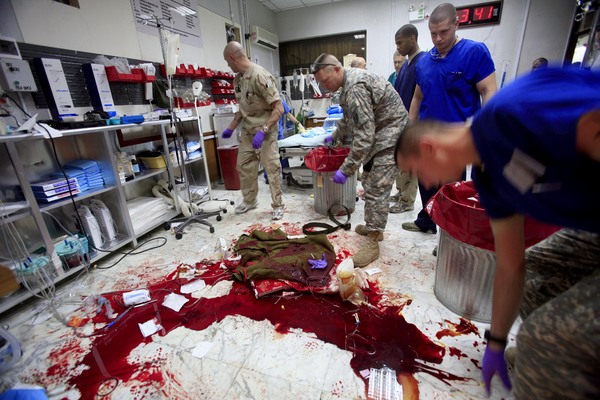Thursday, August 27, 2015
Trauma Is Never Pretty
I've been working trauma cases professionally since the early 1990s. (Before that was simply happenstance.) And while all trauma is the same after the first 500 times, no two are ever exactly alike.
Something you have to know, in a way most of you hopefully will never learn from bitter experience, is that some wounds are non-fixable. Whether you're working with a victim of a car accident or someone attacked by a mob, or simply one dedicated assailant, you have to know going in that you will not fix certain things, and that in many cases, no one can.
Not even if the injury in question happened inside a trauma surgical suite, with the doctors and team prepped and ready to go, even if you had 20 units of O-negative blood hanging ready to transfuse.
HIPPA and concern for a certain family prevent me from getting detailed at this point.
But suffice it to say that sometimes, a gunshot or blade will create more damage than can be fixed, and that person is simply going to die, rapidly.
There's a scene at the beginning of the plane crash in The Grey, when Liam Neeson's character is surveying the injured and dead, and he finds a guy with traumatic abdominal bleeding, and he tells the man, in his final moments, that yes, he is indeed going to die, right there, and rather quickly, which he then proceeds to do on screen.
That was truth: it works just like that in the real world too. When someone pumps out all their lifeblood in ten or twenty pumps, like they will, that's it. Getting an IV won't work, you aren't going to cut them open and crossclamp their aorta, and an IV or five isn't going to save them, because there's no hemoglobin in normal saline.
That means you can start IVs, even IO lines (that's an IV in your bones for the laymen in the audience), and pump in liter after liter of fluid, even with whole blood, and it ain't gonna do anything but come out the hole(s) you can't fix. And run all over the place outside. They'll still get no oxygen in their vital organs, and they'll simply be warm and dead and white as a ghost when you're finished, and that truth is ordained before you ever lay hands on your patient.
That's going to be true in a disaster, or even a trauma unit. In the latter, you do every damned thing you can, especially on a young healthy victim, because they have the best chance. Best being relative when the absolute odds are close to absolutely zero.
In a disaster or worse scenario, you aren't - and probably shouldn't - do all that. At that point, you're simply wasting precious supplies to feel better about someone dying that you couldn't save. Which is both wasteful and unwise.
God help you and your conscience if you haven't wrapped your head around that reality long before the day you get there. Even knowing the truth, the moments will hang around in your head for a good long time.
If you're going to do this, yeah, you save the ones you can.
But you have to know in your bones that there will be plenty you can't save, and you have to let them go. Physically, mentally, and emotionally.
And I can't even begin to tell someone how to do that when it's someone you know, or care for deeply.
Subscribe to:
Post Comments (Atom)

7 comments:
The old fashion term is "triage" IIRC. And as you said life(and death) is seldom as neat as portrayed on the screen, large or small.
I hear ya brother. After 10 years of ICU and Lev 1 Trauma I just had to get out. I don't know if I will ever go back. Right now I would say no. That might change in the future but for now I need to stay away.
Keep going as long as you can, dude. We need people like you. I cannot imagine your mental anguish.
And I can't even begin to tell someone how to do that when it's someone you know, or care for deeply.
What do hospice nurses tell the dying and their relatives?
Hospice nurses are a whole different special species of (supposedly) human.
I can talk with and party with surgeons, trauma specialists, oncologists, surge nurses, geriatricians, paramedics, flight medics, neurosurgeons, epileptologists, (Ok so I got a very catholic group of associates), etc but I simply ain't worthy to breathe the same air as a simple hospice nurse.
VERY special people.
@ErisGuy:
No idea.
The whole point of hospice care is "no more hospital visits", so being a hospital nurse, I never cross paths with them.
I'm not a fan of the Kobayashi Maru scenario, so I really don't like dealing with non-survivable trauma. Frankly, it's a better argument for pronouncing in the field (like in this case), but when it's a 20-something victim who's still warm - albeit bloodless - and the family is all circled around, paramedics ain't gonna do that, ever.
So the ED gets the crap detail, again.
Hospice care is geared towards patients whose condition is terminal, and expected, so there isn't as much surprise as there is relief. For those patients, death is a victory, not a loss.
And the family, grief-stricken as they may be, isn't exactly as taken with shock and surprise when the end comes.
Hospice death vs. trauma death is apples and oranges.
..........Nice..^_^v............
Post a Comment